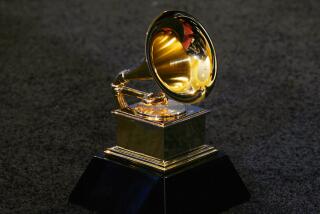The Best Treasures From Chess
- Share via
This feature spotlights noteworthy compilations and reissues .
Albums: “The Best of Chess” (four two-record volumes).
History: Like most of the American record labels that primarily featured black artists during the 1950s, Chicago’s Chess Records was run by white men--in this case, two Polish immigrants, Leonard and Phil Chess. Unlike some of those other owners, however, the Chess brothers had a true interest in authentic blues (as well as in making money). When the pair opened a Chicago nightclub in the ‘40s, they settled on a black-music policy, establishing connections that naturally led to the initial lineup of musicians on their first record label, Aristocrat Records, in 1947. After Muddy Waters scored a hit with “I Can’t Get Satisfied” the brothers started another label under their own name in 1950, and the first release, Waters’ “Rollin’ Stone,” ensured that Chess Records would gather no moss. During the ‘50s Chess and its subsidiaries Checker and Argo became the springboard for some of the most important blues, R&B; and rock artists of the era--Howlin’ Wolf, Little Walter, Chuck Berry, Bo Diddley, Sonny Boy Williamson and Etta James--and the occasional home of others like John Lee Hooker and Elmore James. Though a lesser force during the ‘60s, Chess continued to release significant recordings through the period, boosted for a while by the revival of interest in its artists after the blues-influenced British Invasion. MCA Records has released four two-record sets that offer a fine if somewhat scattered overview of the Chess treasures.
Sound: The four albums are divided into the categories of “Blues,” “Rhythm & Blues,” “Rock ‘n’ Roll” and “Jazz.” The last one may surprise many people, and while the “Jazz” collection is the least representative of the sets, it still contains works by such notables as James Moody, Clark Terry, Zoot Sims, Ahmad Jamal and even Benny Goodman (a 1958 “Benny Rides Again”). The “Blues” and “Rhythm and Blues” are as strong as you’d expect from this source, but the latter is truly indispensable, featuring one towering classic after another--Waters’ “Hoochie Coochie Man,” Wolf’s “Smokestack Lightnin’,” Little Milton’s “Stormy Monday,” Lowell Fulson’s “Reconsider Baby.” . . . If you’d like to sample just one of the LPs, however, the “Rock ‘n’ Roll” volume offers the most variety--not just classic rock like two cuts each from Berry and Diddley but also incredible novelties like Clarence (Frogman) Henry’s “Ain’t Got No Home” and the Monotones’ “Book of Love” plus a few memorable pop ballads such as Johnnie & Joe’s “Over the Mountain, Across the Sea.” The Chess sound was usually full-bodied and forceful despite limited instrumentation and equipment, due to the judicious use of echo, microphone placement and other techniques by Leonard Chess, who produced many of the sessions himself. Each volume has its own extensive liner notes and detailed recording and personnel information. The sound quality is generally good, though a bit rough on some early cuts.
More to Read
The biggest entertainment stories
Get our big stories about Hollywood, film, television, music, arts, culture and more right in your inbox as soon as they publish.
You may occasionally receive promotional content from the Los Angeles Times.










